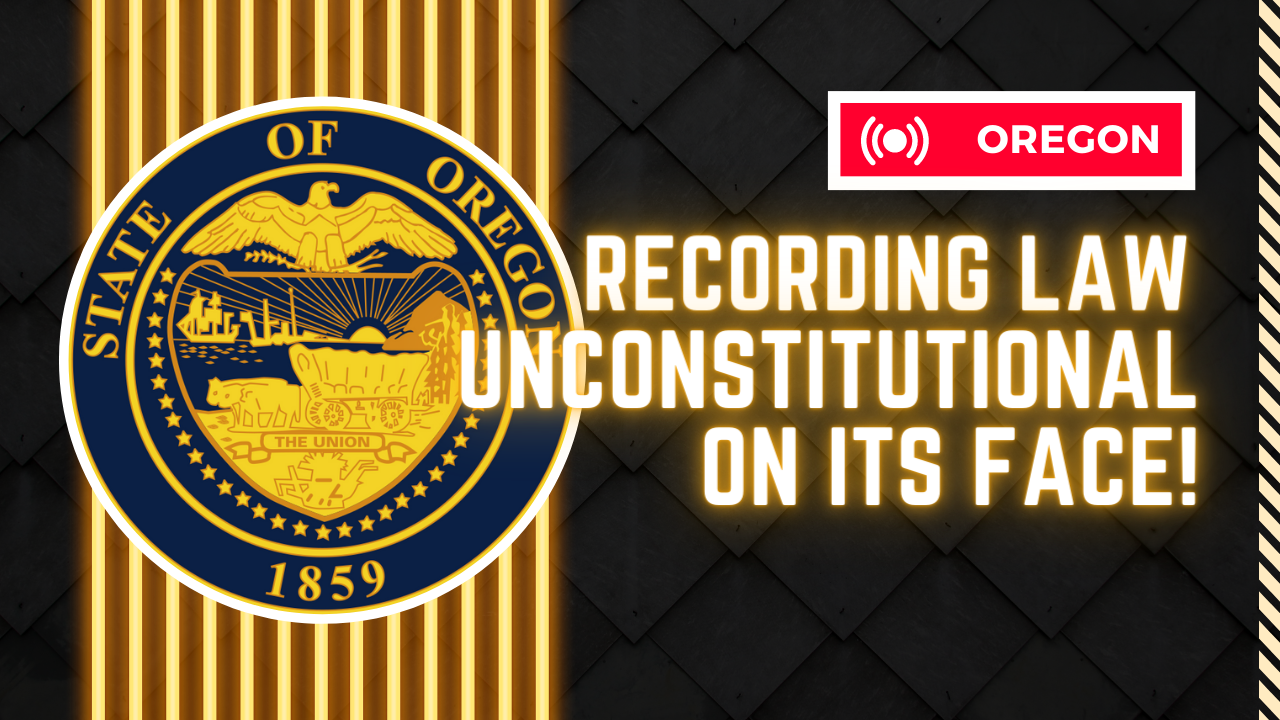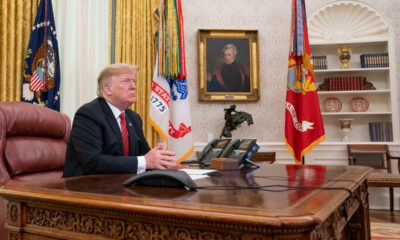First Amendment
Oregon public-place recording law unconstitutional
Oregon forbade most surreptitious recordings in public places. The Ninth Circuit (!) ruled that law “invalid on its face.”

The State of Oregon may no longer forbid an undercover reporter to record a conversation even with an unsuspecting subject. The Court of Appeals for the Ninth Judicial Circuit has just ruled their law unconstitutional “on its face.” Project Veritas and Project Veritas Action Fund v. Schmidt and Rosenblum, 22-35271, July 3, 2023.
Oregon loses
In 1955, Oregon passed a comprehensive law against secret wiretapping, which underwent five amendments in the years since. Project Veritas, in 2020, challenged Section 165-540(1)(c), which specifically created three types of arguable invasions of privacy in public places:
- Surreptitiously recording people in a public place without informing them in advance,
- Obtaining recordings others have made, and
- Distributing such recordings.
The law allows specific exceptions in cases of felonies where human life is at risk, and recording police officers in the performance of their duties when the one doing the recording has the legal right to be at the place in question at the time of the recording.
Michael Schmidt, as District Attorney for Multnomah County, moved for dismissal of the case. Project Veritas responded, based on the exceptions, that these restrictions were content-based and as such abridged freedom of the press. Judge Michael Mossman disagreed, saying the restrictions were content neutral and the law could and did pass “intermediate scrutiny.” The judge granted the motion as to the recording and obtaining claims. Though he kept alive the distribution claim, both sides agreed to dismiss the distribution claim “with prejudice.” Judge Mossman handed down his order on August 10, 2021.
Project Veritas appealed to the Court of Appeals for the Ninth Circuit. Yesterday a three-judge panel reversed the order to dismiss and remanded the case to Judge Mossman’s court. Judge Sandra Ikuta, writing for the panel, wrote:
Oregon law generally prohibits unannounced recordings of conversations, subject to several exceptions. We conclude that Oregon’s law is a content-based restriction that violates the First Amendment right to free speech and is therefore invalid on its face.
Exquisite ironies
Judge Carlos T. Bea voted with Judge Ikuta to support this opinion. Judge Morgan Christen dissented.
The opinion by Judge Ikuta said two things:
- The law as written was a content-based restriction on the press, and
- The text of the law did not allow severance of the unconstitutional parts.
Judge Christen dissented on both grounds.
The appointment histories of the district judge and the members of the panel may or may not be significant:
Judge: Was appointed by President: Mosman Bush Bea Bush Ikuta Bush Christen Obama
The “Bush” above is Bush Junior. In addition, Judge Mosman had experience on the Foreign Intelligence Surveillance Court; Chief Justice John Roberts appointed him.
The most exquisite irony of this case is that, while the case was on appeal to the Ninth Circuit, Project Veritas fired its founder, James O’Keefe. Accordingly, Project Veritas and James O’Keefe dropped separate threads celebrating the decision of the Ninth Circuit.
A Wisconsin resident protested the ruling and said he hoped Oregon would appeal. His argument did not impress other users.
And not only a less accurate version, but a deniable version as well.
Regarding telephonic conversations, Oregon is a “one party consent State,” according to the Digital Media Law Project (DMLP). The DMLP does not keep a section on the Oregon wiretap law or the section at issue.
The State could ask for an en banc rehearing, or petition for certiorari to the U.S. Supreme Court.
Terry A. Hurlbut has been a student of politics, philosophy, and science for more than 35 years. He is a graduate of Yale College and has served as a physician-level laboratory administrator in a 250-bed community hospital. He also is a serious student of the Bible, is conversant in its two primary original languages, and has followed the creation-science movement closely since 1993.
-

 Civilization3 days ago
Civilization3 days agoWhy Europe Shouldn’t Be Upset at Trump’s Venezuelan Actions
-

 Executive4 days ago
Executive4 days agoHow Relaxed COVID-Era Rules Fueled Minnesota’s Biggest Scam
-

 Christianity Today3 days ago
Christianity Today3 days agoSurprising Revival: Gen Z Men & Highly Educated Lead Return to Religion
-

 Civilization4 days ago
Civilization4 days agoThe End of Purple States and Competitive Districts
-

 Executive4 days ago
Executive4 days agoWaste of the Day: Can You Hear Me Now?
-

 Executive5 days ago
Executive5 days agoWaste of the Day: States Spent Welfare in “Crazy Ways”
-

 Civilization1 day ago
Civilization1 day agoWhy Europe’s Institutional Status Quo is Now a Security Risk
-

 Civilization2 days ago
Civilization2 days agoDeporting Censorship: US Targets UK Government Ally Over Free Speech














